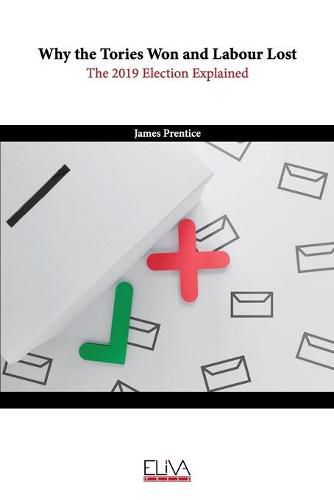Readings Newsletter
Become a Readings Member to make your shopping experience even easier.
Sign in or sign up for free!
You’re not far away from qualifying for FREE standard shipping within Australia
You’ve qualified for FREE standard shipping within Australia
The cart is loading…






As the Brexit stalemate lingered the British government searched for a way out of the crisis. They managed to force a snap election in November 2019, producing the first winter general election in a century. The Conservatives dubbed it the "Brexit election" and decided to focus on the message of "getting Brexit done", whilst Labour aimed to change the narrative to one that focused on economic debates. On a wet winter's day the voters braved the polls, and as the polling stations closed the exit poll announced a historic win for the Tories, with them gaining an 80 seat overall majority. Through the night the media announced the long list of longstanding Labour seats falling to the Tories, the Red Wall had crumbled. As the news coverage rolled on, news stations invited commentators to debate the reasons behind the election result. Many pundits, commentators and academics failed to predict the scale of the Conservatives' win and the magnitude of Labour's defeat, and greatly disagreed on what the causes of the unexpected result were. Those loyal to the left blamed Brexit for Labour's problems, whilst many commentators in the media noted the difference in campaign quality and leadership style. Using polling data and the British Election Study, this statistical analysis examines the core explanations behind Johnson's victory, such as Brexit and leadership theories, so to explain the main cause to why the Tories won and Labour lost. This analysis identifies how new voting alliances were formed, particularly with Tories securing former loyal Labour voters, thus allowing for a detailed understanding of this era-defining election.
$9.00 standard shipping within Australia
FREE standard shipping within Australia for orders over $100.00
Express & International shipping calculated at checkout
As the Brexit stalemate lingered the British government searched for a way out of the crisis. They managed to force a snap election in November 2019, producing the first winter general election in a century. The Conservatives dubbed it the "Brexit election" and decided to focus on the message of "getting Brexit done", whilst Labour aimed to change the narrative to one that focused on economic debates. On a wet winter's day the voters braved the polls, and as the polling stations closed the exit poll announced a historic win for the Tories, with them gaining an 80 seat overall majority. Through the night the media announced the long list of longstanding Labour seats falling to the Tories, the Red Wall had crumbled. As the news coverage rolled on, news stations invited commentators to debate the reasons behind the election result. Many pundits, commentators and academics failed to predict the scale of the Conservatives' win and the magnitude of Labour's defeat, and greatly disagreed on what the causes of the unexpected result were. Those loyal to the left blamed Brexit for Labour's problems, whilst many commentators in the media noted the difference in campaign quality and leadership style. Using polling data and the British Election Study, this statistical analysis examines the core explanations behind Johnson's victory, such as Brexit and leadership theories, so to explain the main cause to why the Tories won and Labour lost. This analysis identifies how new voting alliances were formed, particularly with Tories securing former loyal Labour voters, thus allowing for a detailed understanding of this era-defining election.